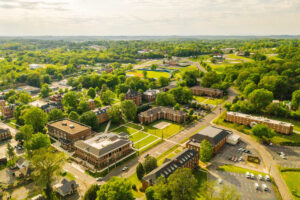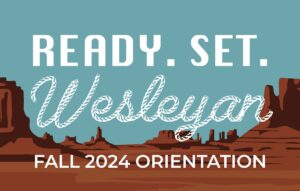My Summer In Kazakhstan
April 29, 2024 2024-04-30 12:33My Summer In Kazakhstan
My Summer In Kazakhstan
By Dr. Jack Seitz
Assistant Professor of History
With the help of a Summer Faculty Fellowship from the Appalachian Colleges Association, I spent the end of May through early July 2023 in Kazakhstan conducting archival research for a new book project tentatively entitled “Soviet Power: Energy and the Making of Modern Kazakhstan.” The project shows how workers, politicians, scientists and ordinary people interacted with various types of energy (coal, oil, and nuclear) to create and contest their identities as Soviets and as Kazakhstanis.
In the city of Almaty, I spent a month and a half working in the Central State Archive of the Republic of Kazakhstan and the Central State Archive of Film, Photo Documents, and Sound Recording of the Republic of Kazakhstan. I conducted research at the National Library of Kazakhstan. These documents were in Russian, although given the pre-1917 involvement of foreign corporations. And while most people speak Russian in Almaty, I got to use my spoken Kazakh as well. This was an important reminder of the importance of foreign language study as part of a liberal arts education!
A History of Kazakhstani Energy
I spent my time looking at documents from several different government entities tasked with constructing and developing Kazakhstan’s energy infrastructure, such as the Ministry of Energy of the Kazakh Soviet Socialist Republic. I was particularly interested in understanding the process of electrification given Kazakhstan’s huge area and relatively low population density. I also spent time better understanding how the USSR tried to rebuild the oil and coal industries after the destruction and disruption of WWI, the 1917 Revolution, and the Civil War. Including interesting information about how the Soviet’s created a camel caravan to transport oil pumped out of the ground in Kazakhstan to cities in Russia in the years after the Revolution.
While most of the book focuses on the Soviet period (1917-1991), I was interested in the pre-1917 coal and oil industries. Therefore, I spent a lot of time looking at documents from the Ural-Caspian Oil Company, a joint British-Russian enterprise that produced oil in Western Kazakhstan in the years before the 1917 Bolshevik Revolution. This included telegrams, memos, letters, geologic reports, budgets, and government decrees. Similarly, I looked at documents from the Kirghiz Mining Company, which was led by Leslie Urquhart a Scottish mining engineer and businessman. Urquhart was also a business partner in this project with future US President Herbert Hoover. This company oversaw mining in the region of northern Kazakhstan near Ekibastuz in the years before the Revolution. Eventually, these mines would come to be exploited on a much larger scale during the Soviet period.
Pre Bolshevik Revolution
During my time I also explored the delights of Almaty. The city has a wonderful café culture, tree lined streets, and lots of art and culture. I met and networked with several Kazakh and US historians of Kazakhstan. While I spent most of my working days in the archives and library, I managed to explore Kazakhstan’s stunning scenery. This included trips to the countryside where my friend lives as well as an excursion to the Charyn Canyon, and explore the Ile Alatau Mountains including the Kolsay Lakes National Park.
A brief stop over in Doha, Qatar provided me an opportunity to explore and learn more about the Persian Gulf. This will help me improve my courses on the history of the Islamic World and the Modern Middle East. In addition, Qatar has undergone a radical transformation from a poor peninsula made up of Bedouin and pearl traders to one of the most dynamic and booming economies in the world. The central role that energy played in shaping this transition is part of how I am conceptualizing my own project on energy transformation in Kazakhstan.

















